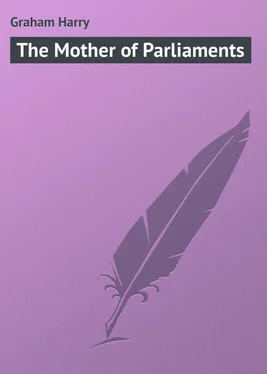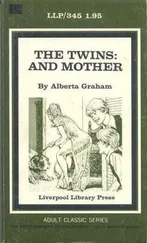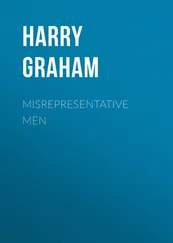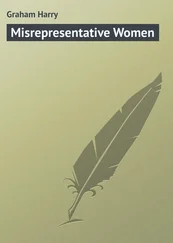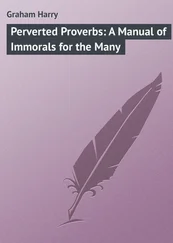Harry Graham - The Mother of Parliaments
Здесь есть возможность читать онлайн «Harry Graham - The Mother of Parliaments» — ознакомительный отрывок электронной книги совершенно бесплатно, а после прочтения отрывка купить полную версию. В некоторых случаях можно слушать аудио, скачать через торрент в формате fb2 и присутствует краткое содержание. Жанр: foreign_prose, на английском языке. Описание произведения, (предисловие) а так же отзывы посетителей доступны на портале библиотеки ЛибКат.
- Название:The Mother of Parliaments
- Автор:
- Жанр:
- Год:неизвестен
- ISBN:нет данных
- Рейтинг книги:5 / 5. Голосов: 1
-
Избранное:Добавить в избранное
- Отзывы:
-
Ваша оценка:
- 100
- 1
- 2
- 3
- 4
- 5
The Mother of Parliaments: краткое содержание, описание и аннотация
Предлагаем к чтению аннотацию, описание, краткое содержание или предисловие (зависит от того, что написал сам автор книги «The Mother of Parliaments»). Если вы не нашли необходимую информацию о книге — напишите в комментариях, мы постараемся отыскать её.
The Mother of Parliaments — читать онлайн ознакомительный отрывок
Ниже представлен текст книги, разбитый по страницам. Система сохранения места последней прочитанной страницы, позволяет с удобством читать онлайн бесплатно книгу «The Mother of Parliaments», без необходимости каждый раз заново искать на чём Вы остановились. Поставьте закладку, и сможете в любой момент перейти на страницу, на которой закончили чтение.
Интервал:
Закладка:
The necessity for a second chamber of some sort has always been admitted, if only to prevent the other House from being exposed to what John Stuart Mill calls "the corrupting influence of undivided power," and Cromwell "the horridest arbitrariness that was ever known in the world." Few, however, of the most ardent admirers of the hereditary system will pretend that the problem of a perfect bicameral system is solved by the present House of Lords, though they may doubtless claim that the cause of its failure does not rest entirely upon its basis of heredity. "You might as well urge as an objection to the breakwater that stems the unruly waves of the sea, that it has its foundations deep laid in another element, and that it does not float on the surface of that which it is to control," said Palmerston, "as say that the House of Lords, being hereditary, ought on that account to be reformed." 37 37 In a speech delivered at a banquet in Glasgow on January 13, 1837.
If age can confer dignity and distinction upon any assembly, then must the House of Lords be peculiarly distinguished, for it is certainly the most venerable as well as the most antiquated of our Parliamentary institutions.
When Christianity became firmly established in England, each king of the Heptarchy was attended by a bishop, whose business it was to advise his royal master upon religious questions, and who thus acquired the power of influencing him in other matters as well. The minor kings were gradually replaced by earls, who were summoned, together with their attendant bishops, to the Witenagemot of the one ruling sovereign of the country. An assembly of this nature was held as far back as 1086, but it was more in the nature of a judicial Court than a Parliament. It consisted of the Archbishop of Canterbury and all other bishops, earls, and barons, and was summoned to decide important judicial cases. This Court, or Curia Regis as it was called, met at different times and in divers places. It transacted other business besides the judicial, and also corresponded to some extent with the more modern levée . It was originally composed of the Lords, the great officers of State, and some others whom the king wished to consult.
The exact position which such nobles held in the great Council of the land is not very definite. Immediately after the Conquest an earldom appears to have been regarded as an office; but it was not necessarily hereditary. Later on the possession of lands, either granted direct by the Crown or inherited, became a necessary qualification for the holder of an earldom. The transfer of titles and property in early days was a rough and ready affair, in which might played as great a part as right. (When Edward I. required the old Earl de Warrenne to produce his title deeds, the latter brought out a rusty sword that had belonged to his ancestors. "By this instrument do I hold my lands," he said, "and by the same do I intend to defend them!") But with the natural idea of the transference of land from father to son there developed the principle of the natural hereditary descent of the title dependent upon the possession of those lands.
The baronage did not come into existence until after the Conquest. In the reign of Henry I. it was entirely composed of foreigners from France. Barons held no regular office, but their lands were transferred on the hereditary principle. They owed military allegiance to the Crown, but did not necessarily sit in Parliament unless summoned to attend by the king. Such a summons was long regarded as a burden rather than a privilege, and even in the days of King John the barons only desired it as a protection from the imposition of some exceptional tax. The bishops and barons were then the natural leaders of the people; they alone were educated and armed, and they alone could attempt any successful resistance to the exorbitant demands of the Crown. They paid nearly all the taxes, and provided money for the prosecution of every war. Upon them the commonalty was dependent, looking to them for assistance when the sovereign became too grasping or tyrannical. It was the barons who forced King John to sign Magna Charta, and to them, therefore, we are indebted for the laws and constitution which we now possess. "They did not confine it to themselves alone," as Chatham declared in the House of Lords, on January 9, 1770, "but delivered it as a common blessing to the whole people." But though the present House of Lords has been described as composed of descendants of the men who wrung the Charter from King John on the plains of Runnymede, not more than four of the existing peerages are, as a matter of fact, as old as Magna Charta.
The feudal barons by tenure, whose right to a Parliamentary summons gradually became hereditary as going with their lands, were gradually joined by other prominent men who, though not landowners, were summoned to give the Council the benefit of their experience and advice. Thus gradually evolved the modern system of hereditary legislators, and the House of Lords developed into an assembly such as we now know it, though numerically far smaller.
In Richard II.'s reign the Curia Regis separated from Parliament and became a Privy Council. The Lords were then as unwilling as the Commons to attend diligently to their Parliamentary duties, and it was only the subsequent creation of dukes, marquesses, and viscounts that stimulated the desire to sit and claim a writ of summons as a right.
The number of earls and barons summoned to Parliament in the reigns of the first three Edwards varied from fifty to seventy-five. At times, owing to the absence of the fighting men of the country who were engaged in foreign warfare, it fell as low as sixteen. In the first Parliament of Henry VIII. there were less than thirty temporal peers, but in Elizabeth's time this number had doubled. Since Stuart days the Lords have become more and more numerous. James I. granted peerages right and left to his favourites, and, by selling baronies, viscountcies, and earldoms for sums ranging from £10,000 to £20,000, enriched his coffers and added some fifty members to the Upper House. The eighty-two temporal peers who sat in his first Parliament were gradually reinforced by his successors, until, in the time of George III., they numbered two hundred and twenty-four, exclusive of their ecclesiastical brethren.
The Lords spiritual have not always sat in the House of Lords. In early days the abbots and priors largely predominated in that assembly, but with the abolition of the monasteries they were banished from it, though a certain number retained their seats in right of the baronies which they possessed. 38 38 In the sixteenth century the Prior of the Hospital of St. John of Jerusalem (near Clerkenwell), whom Selden calls "a kind of an otter, a knight half-spiritual and half-temporal," had precedence of all the lay barons in Parliament. His priory was suppressed in 1536, but his name continued to appear spasmodically in the Journals of the House of Lords until some time in Queen Elizabeth's reign.
Bishops were excluded from the House of Lords by Act of Parliament in 1640 – Cromwell omitted to summon them to his Upper House in 1657 – and were not finally readmitted until 1661. Within living memory several unsuccessful attempts have been made to keep them out of Parliament. In 1836 a member of the Commons moved that spiritual peers be released from attendance, but his motion was defeated. Another member in the following year suggested their exclusion on the ground that they had plenty to occupy them elsewhere, that their contributions to debate upon most legislative subjects were not particularly edifying, and that they always voted with the Minister to whom they were indebted for preferment. This motion met a fate similar to that of its predecessor, as did another of the same kind in 1870.
Интервал:
Закладка:
Похожие книги на «The Mother of Parliaments»
Представляем Вашему вниманию похожие книги на «The Mother of Parliaments» списком для выбора. Мы отобрали схожую по названию и смыслу литературу в надежде предоставить читателям больше вариантов отыскать новые, интересные, ещё непрочитанные произведения.
Обсуждение, отзывы о книге «The Mother of Parliaments» и просто собственные мнения читателей. Оставьте ваши комментарии, напишите, что Вы думаете о произведении, его смысле или главных героях. Укажите что конкретно понравилось, а что нет, и почему Вы так считаете.
